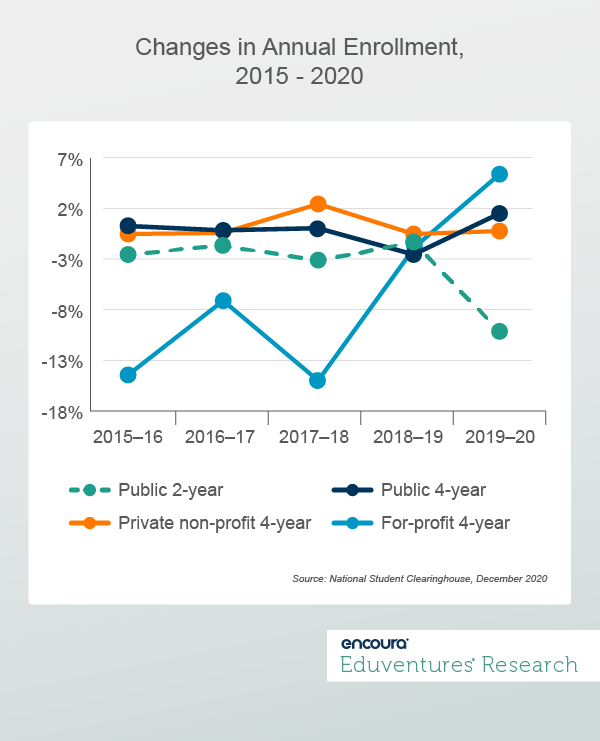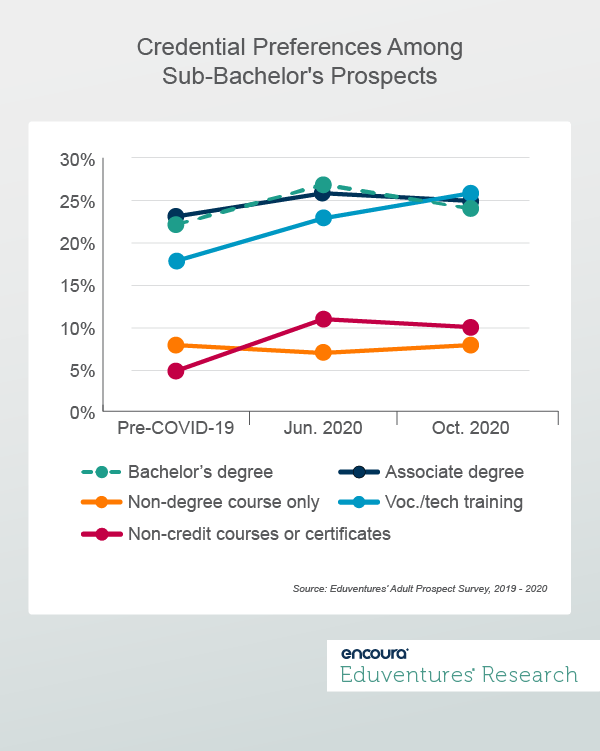EliWith a few exceptions, there are two key questions keeping community college leaders up at night this summer:
“Where did they go? And, what can we do to bring them back?”
Their experience of the last year is something more ominous than a pandemic-induced enrollment decline; it’s the year-over-year disappearance of 11.3% of learners from public two-year institutions (more than 500,000 people)—worsening a Fall 2020 drop of 10.1%. While the pandemic has exacerbated the problem, it’s essential to understand why it is happening, what can be done, and what implications this has for other segments of our postsecondary system.
This will be a focus of an upcoming session at Eduventures Summit Virtual Research Forum on June 16, 2021, featuring the leadership of Strada Education Network, the co-presenting partner of Summit.
Community colleges have been facing hard times for a decade.
This has reflected, in part, declines in birthrates and increases in dual enrollment at both community colleges and four-year schools that tends to favor subsequent four-year enrollment. But much of this slide can be attributed to a robust economy with low unemployment, diminishing the appeal of part- or full-time enrollment at local community colleges.
During the same time, adults with only a high school diploma have also had a wider menu of training and credential options to select from. Based on data from the Department of Labor, IPEDS, Coursera, and Course Report, Eduventures has calculated that in 2019 alone, more than 650,000 working adults enrolled in apprenticeships, bootcamps, and corporate training programs. Factor in the sizeable net increase in four-year school enrollment over this period, and the community college decline morphs into a story of new competition as well as a strong economy followed by a pandemic.
Figure 1 shows both the pre-pandemic and precipitous 2020 decline in public two-year enrollment.

By contrast, four-year enrollment has been stable, and for-profit numbers have rebounded strongly after years of decline.
But the most recent iterations of Eduventures’ Adult Prospect Survey suggests that the precipitous declines in community college enrollment is not due to a lack of interest. In surveys of more than 9,000 adult prospects conducted between July 2019 and October 2020, preferences for undergraduate degrees and certificates held steady, and in some cases, intensified. This was most notable for non-degree, vocational, and technical training.
Figure 2 shows credential preferences for prospects who only had a high school degree or who had attended college but had not graduated.

During this relatively short period of time, interest in associate and bachelor’s degrees leveled off—nowhere near the declines that have emerged from actual enrollment trends. At the same time, there’s been a notable increase in interest in technical and vocational training—a trend that perhaps, along with online learning advances at some institutions, helps explain the for-profit school resurgence in Figure 1.
Given these baselines, what might be the formula to convert these levels of interest into actual enrollment?
Evidence-Driven Interventions
Strada Education Network’s most recent research, Powering Purpose, is based on data and analysis of working-age adults and identifies a series of interventions, policy reforms, and incentives designed to close the gap between postsecondary interest and enrollment at two- and four-year institutions, as well as non-traditional providers. These insights will shape the core of the Strada session on June 16..
Strada’s Powering Purpose research combines two data sets: a set of national trends identified through its Public Viewpoint surveys collected since March 2020, and county and street-level data sets collected by CollegeAPP, an independent consumer survey of adult learners in six large states. The combination of these data sets has helped Strada, and its affiliate organizations, recognize patterns echoed in the Eduventures Adult Prospect Survey: strong interest among 20,500,000 working adults to enroll in a technical or community college within 24 months offset by the debilitating consequences of the pandemic.
Strada believes that reversing these trends is an economic and moral imperative. The organization contends that it is possible to rethink postsecondary enrollment, credentialing, and employer-partnerships without a whole-sale rebuild of the sub-baccalaureate system. This can apply to the current community college enrollment collapse, while also addressing enrollment challenges at other types of institutions and credential providers.
Strada’s session at Eduventures Summit 2021 will provide the latest evidence and best practices for student-centered interventions. It features the following speakers:
- Ruth Watkins, President, Strada Impact
- Earl Buford, President of the Council for Adult and Experiential Learning (CAEL)
- Jaime Nunez, President of Education at Work
The panel will be moderated by Janet Salm, Managing Director of Strada Education Network.
The Bottom Line
The next chapter of the community college enrollment collapse will invariably be influenced and impacted by the Biden administration’s economic recovery plans and potential efforts to create “free” community college educations. In the interim, there’s no magic potion to reverse vanishing community college enrollment. Instead, it can be found in the pragmatism and decision-making of prospective community college learners. As Janet Salm of Strada is quick to remind us, working adult learners “are the experts in their lives- they know what they want; we just need to listen carefully and respond.”
At Eduventures Summit 2021, we will also explore many of these same themes in a special president’s panel discussion featuring the following leaders:
- Elizabeth Bradley, President of Vassar College
- Gregory Fowler, President of University of Maryland Global Campus
- Marc Jerome, President of Monroe College
Registration for Eduventures Summit 2021 Virtual Research Forum is open. We look forward to you joining us on June 16.
Never Miss Your Wake-Up Call
Learn more about our team of expert research analysts here.
Eduventures Principal Analyst at ACT | NRCCUA
Contact
The Program Strength Assessment (PSA) is a data-driven way for higher education leaders to objectively evaluate their programs against internal and external benchmarks. By leveraging the unparalleled data sets and deep expertise of Eduventures, we’re able to objectively identify where your program strengths intersect with traditional, adult, and graduate students’ values, so you can create a productive and distinctive program portfolio.
